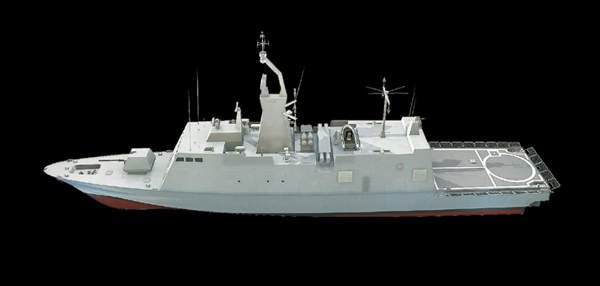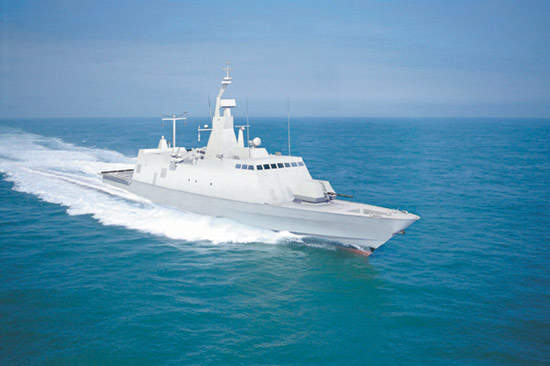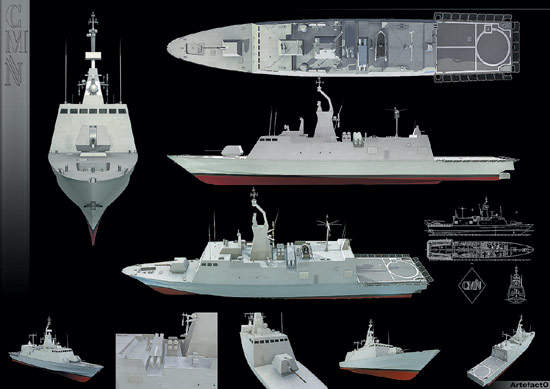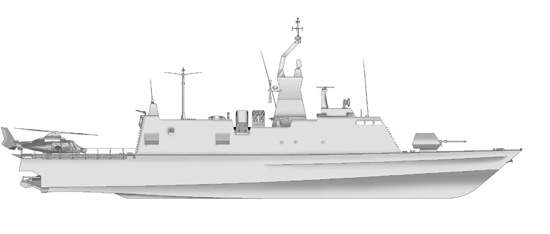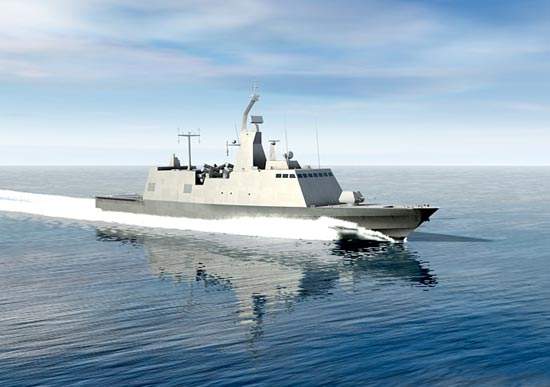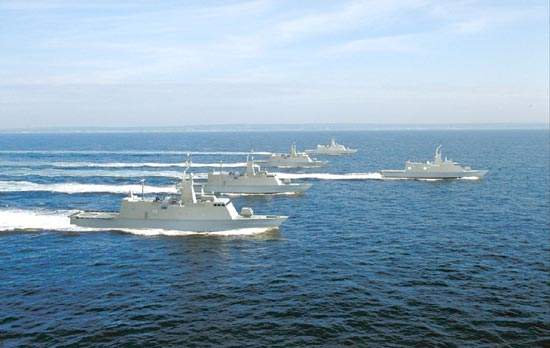In January 2004, the United Arab Emirates’ Ministry of Defence in Abu Dhabi awarded a contract to Abu Dhabi Shipbuilding (ADSB) for a new class of multipurpose missile corvette, called Baynunah. The contract originally stood at for four corvettes with an option on a further two which was exercised in July 2005 in a Dh3.67bn ($1bn) deal.
The Baynunah programme is a successor to the LEWA 1 programme to replace the six 175t full displacement, 33.5m Ardhana Class large patrol class.
Baynunah class corvette construction and development
The corvettes are named after the Baynunah region of Abu Dhabi. Construction of the first vessel began in May 2005 and launched in June 2009 at CMN’s Cherbourg shipyard. The vessel completed its sea trials in February 2010 and was delivered to the UAE Navy in 2011.
ADSB is the prime shipbuilder and Constructions Mecaniques de Normandie (CMN) of Cherbourg, France is a further major contractor. The Baynunah project is the largest and most important contract for ADSB to date.
The remaining five corvettes were built at the ADSB shipyard at Mussafah in Abu Dhabi. Keel for the first locally built vessel was laid in July 2006, launched in 2010 and commissioned in 2011.
The main roles of the corvettes will be in patrol and surveillance, minelaying, interception and other anti-surface warfare operations in the United Arab Emirate’s territorial waters and exclusive economic zone.
The vessels are slated to be the largest steel-hulled vessels using water jets for propulsion. ADSB has submitted a bid to supply corvettes to the Kuwait and Saudi Navy.
Baynunah class corvette design
The design of the corvette was carried out jointly by CMN and ADSB and is a derivative of CMN’s BR70 70m corvette design with a deep-V hard-chine hull. A low draught allows the corvette to operate in shallow waters. Emphasis is directed to good seakeeping characteristics and manoeuvrability.
The light corvettes are substantially larger than the new-generation Combattante I, the Um Almaradim Class patrol vessels supplied to Kuwait from 1998 to 2000. The Baynunah corvettes incorporate a stealthy superstructure, a helicopter landing deck and a hangar. They accommodate 55 officers and other crew members.
Baynunah weapon systems
In July 2004, Alenia Marconi Systems, now Selex Sistemi Integrati, was awarded a contract to supply the IPN-S command and control system and the NA-25XM fire control system for the main gun. Selex is also responsible for integration of weapons and sensors into the combat system. The Baynunah vessels will also be fitted with the Sagem Vigy EOMS infrared search and track and weapons director.
The corvette’s anti-ship missile system comprises eight MBDA MM40 block 3 Exocet missiles. The block 3 missile has a new turbojet propulsion system that extends the effective range from 70km to 180km. It has new inertial / GPS guidance along with an advanced J-band active terminal seeker. The sea-skimming Exocet missiles approach the target at high subsonic speed, Mach 0.9, to deliver a 165kg warhead. The Exocet is also deployed on the United Arab Emirates Muray Jib Class corvettes, Ban Yas Class and Mubarraz Class fast attack missile craft.
The corvette is fitted with four Raytheon MK56 eight-cell vertical launchers for the ESSM. ESSM gives surface-to-air capability to protect against fixed-wing and rotary-wing platforms.
In September 2007, the UAE placed an order with Raytheon for 32 ESSM missiles, to be delivered by 2010. This was in addition to the rolling airframe missile (RAM) system for close-in air defence, ordered in December 2006 to equip the Baynunah Class.
One mk49 mod3 21-cell RAM launcher for the RAM block 1A missile system will be fitted on top of the hangar roof. The installation will require a number of design modifications. The systems are to be installed by 2011. RAM has radio frequency / infrared dual-mode guidance and a range of 8km. The block 1 missile has a new image scanning infrared seeker.
The corvette’s main gun is the Oto Melara 76/62mm Super Rapide, capable of firing 6kg shells at a rate of 120 rounds a minute to a maximum range of 16km. Two Rheinmetall MLG 27 27mm guns are also being fitted.
Mine laying, detenction avoidance and disposal
The corvette design includes capacity for the future installation of mine warfare systems. The corvette is capable of deploying a full range of mine-laying, mine detection, avoidance and disposal systems to suit the operational requirements of the United Arab Emirate’s Navy.
The layout of the flight deck allows the installation of mine rails for mine laying. The combat management system includes minefield planning software.
The NDS 3070 Vanguard hull-mounted mine and obstacle avoidance sonar, from L-3 ELAC Nautik, will be installed and a remotely operated vehicle for detection, location and disposal of mines may also be fitted.
Helicopter deck
The Baynunah corvette has a stern helicopter deck with a single landing spot for a medium-sized helicopter such as the AS 565. The United Arab Emirates operate seven Eurocopter AS 565 Panther anti-surface helicopters. The corvette has a fully equipped hangar.
Surveillance, navigation and fire control radar
The Baynunah corvettes are fitted with a Saab Microwave Systems (formerly Ericsson) Sea Giraffe AMB (agile multiple beam) 3D surveillance radar and a Terma I-band navigation radar. Fire control radar for the NA-25 is the Selex Orion RTN 25 X-band radar.
Naval countermeasure systems
The electronic warfare suite includes an NLWS310 laser warning system from Saab Avitronics of South Africa, an Elettronica SLR-736E radar electronic support measures system (ESM) and a Thales Altesse communications ESM.
The MASS decoy system, supplied by Rheinmetall Waffe Munition (formerly Buck Neue Technologien), will be installed, one to port and one to the starboard side. MASS can launch up to 32 Omni-Trap spin-stabilised omni-spectral projectiles in a time-staggered configuration against anti-ship missiles and guided projectiles.
The MASS decoy covers radar, infrared, electro-optic, laser and ultraviolet wavebands.
Secure naval communications systems
The corvettes have secure voice and data communications, including Link 11 and Link Y mk2, with the fleet, land based command and control centres and with the CN-235 maritime patrol aircraft.
Water jet propulsers
Four diesel engines type 12V595 TE90 from MTU are each rated at 4.2MW. The corvettes have water jet propulsers giving high manoeuvrability. The cruise and maximum speeds are 15kt and over 32kt. The range is over 2,400nm. The corvette carries water, stores and fuel for an endurance of 14 days.

